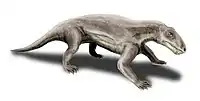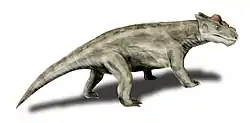Ustia (therapsid)
Ustia is an extinct genus of biarmosuchian therapsids from the Middle Permian of Russia. It is known from a single species, Ustia atra, which was described in 2003 from an isolated lower jaw. Ustia was classified in the family Ictidorhinidae, which also includes the genus Ictidorhinus from South Africa. Both are relatively small biarmosuchians.[1] Several other Russian therapsids known only from lower jaw bones have been placed in Ictidorhinidae, and the family is likely a paraphyletic assemblage representing a small body type than a true clade.[2]
| Ustia Temporal range: Middle Permian | |
|---|---|
| Scientific classification | |
| Domain: | Eukaryota |
| Kingdom: | Animalia |
| Phylum: | Chordata |
| Clade: | Synapsida |
| Clade: | Therapsida |
| Suborder: | †Biarmosuchia |
| Genus: | †Ustia Ivachnenko, 2003 |
| Type species | |
| †Ustia atra Ivachnenko, 2003 | |
References
- Ivakhnenko, M. F. (2008). "Cranial morphology and evolution of Permian Dinomorpha (Eotherapsida) of eastern Europe". Paleontological Journal. 42 (9): 859–995. doi:10.1134/S0031030108090013.
- Sidor, C. A. (2003). "The Naris and Palate of Lycaenodon Longiceps (Therapsida: Biarmosuchia), with Comments on Their Early Evolution in the Therapsida". Journal of Paleontology. 77 (5): 977–984. doi:10.1666/0022-3360(2003)077<0977:TNAPOL>2.0.CO;2.
This article is issued from Wikipedia. The text is licensed under Creative Commons - Attribution - Sharealike. Additional terms may apply for the media files.

